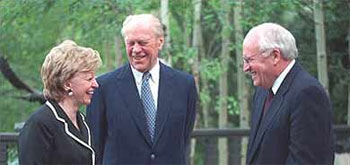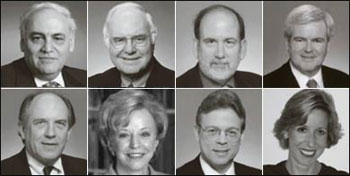Conference Hosted by the American Enterprise Institute
Washington, DC
by Christopher Smith
November 14, 2002
NOTICE: THIS WORK MAY BE PROTECTED BY COPYRIGHT
YOU ARE REQUIRED TO READ THE COPYRIGHT NOTICE AT THIS LINK BEFORE YOU READ THE FOLLOWING WORK, THAT IS AVAILABLE SOLELY FOR PRIVATE STUDY, SCHOLARSHIP OR RESEARCH PURSUANT TO 17 U.S.C. SECTION 107 AND 108. IN THE EVENT THAT THE LIBRARY DETERMINES THAT UNLAWFUL COPYING OF THIS WORK HAS OCCURRED, THE LIBRARY HAS THE RIGHT TO BLOCK THE I.P. ADDRESS AT WHICH THE UNLAWFUL COPYING APPEARED TO HAVE OCCURRED. THANK YOU FOR RESPECTING THE RIGHTS OF COPYRIGHT OWNERS.
First, I would like to congratulate the New Atlantic Initiative here at AEI, and the many cosponsors, for organizing this important conference which will help to focus attention on the dire situation in Belarus and ways to encourage change there.
When measured against other European countries, the state of human rights and democracy in Belarus is abysmal, bearing closer resemblance to some of the states of Central Asia. Belarusian dictator Alexander Lukashenka – Europe’s remaining dictator – persistently flouts OSCE commitments that Belarus freely undertook when it became an OSCE participating State a decade ago. Belarus stands out from many post-Soviet states in that its record in the immediate post-independence period indicated some progress, but suffered a dramatic reversal with the 1994 election of Lukashenka.
I believe we are all aware of the long list of human rights assaults by the Lukashenka regime over the course of the past eight years. Many of us, including members of the Helsinki Commission, have repeatedly spoken out against human rights abuses in Belarus and urged compliance with OSCE obligations. Nevertheless, just within the last few months, we have seen the passage of a repressive law on religion which bans religious activity by groups not registered with the government and forbids most religious meetings on private property, the bulldozing of a newly-built church, the incarceration of leading independent journalists, and the continued harassment, as well as physical attacks on the political opposition, independent media and non-governmental organizations – in short, anyone who, through their promotion of democracy, would stand in the way of the Belarusian dictator. (And as we all know, just last week, Anatoly Lebedka, who is present here today, was detained and interrogated by the Belarusian KGB after leaving the US Embassy in Minsk to pick up an invitation for this conference.) Moreover, we have seen no progress on the investigation of the disappearances of political opponents – perhaps not surprisingly, as credible evidence points at the involvement of the regime in their murders. Furthermore, growing evidence also indicates Belarus has been supplying military training and weapons to Iraq, in violation of UN sanctions.
Most recently, Lukashenka’s expulsion of the OSCE presence in Belarus has further isolated Belarus from the international community and right now, the OSCE is grappling with how to handle this issue following the OSCE Secretary General’s visit there last week, where he received some pronouncements of good will. What we need now is concrete progress by Belarus towards cooperation with the OSCE, and not more pronouncements, which we’ve been hearing for years without any followup action.
As a leader of our U.S. delegation to the OSCE Parliamentary Assembly (PA) at our sessions over the last few years I’ve confronted the question of the seating of Members of the National Assembly, the legitimacy of which has been a subject of considerable debate. My colleagues and I on the Helsinki Commission, in a letter to OSCE PA President Bruce George, have proposed a roadmap by which Belarus can begin to overcome the impasse – not only with respect to the seating of the National Assembly at the PA – but more importantly, with respect to ending its self-imposed isolation.
The roadmap, simply put, involves the Belarusian authorities, including parliamentarians, to undertake concrete steps toward meeting the four criteria for democratic elections established by the OSCE Troika back in April 2000. These longstanding criteria include an end of the climate of fear, access to the state media for all candidates, respect for freedom of assembly, and transparency and fairness in the registration of candidates and functioning of electoral commissions. An essential step in the right direction for the National Assembly would be to bring the electoral code up to democratic standards, the proper implementation of which would contribute to the democratization process in Belarus.
Another step would be the creation of a commission that would investigate the still unresolved disappearances of Lukashenka’s political opponents in 1999-2000. I recognize and commend the recent attempts in the National Assembly to question high-ranking officials in the Belarusian Government about the disappearances, and deplore the executive’s lack of cooperation with these efforts to get at the truth. I encourage the Assembly to probe further and have the courage to continue its stand until the truth is discovered.
As many of you know, I introduced the Belarus Democracy Act earlier this year, which is intended to demonstrate support for those struggling to promote democracy and respect for human rights in Belarus. Among other things, the bill authorizes an increase in assistance for democracy-building activities, encourages free and fair parliamentary elections, and imposes sanctions against the Lukashenka regime, including denying its high-ranking officials entry into the United States and the prohibition of strategic exports to Belarus. I am proud to have sponsored this bill and look forward to moving it quickly through the legislative process in the 108th Congress.
The Belarusian people, who suffered profoundly over the course of the last century owing to Soviet domination, Nazi invasion and Chornobyl, deserve better than the heavy hand of Alexander Lukashenka. Together, we must work to help bring democracy to Belarus and make respect for human rights an integral part of the Belarusian experience. The Belarusian people deserve our support as they work to overcome the legacy of the past and develop a genuinely independent, democratic country based on the rule of law and democratic institutions.
Many thanks to each of you for your interest in fostering genuine freedom for the Belarusian people.


